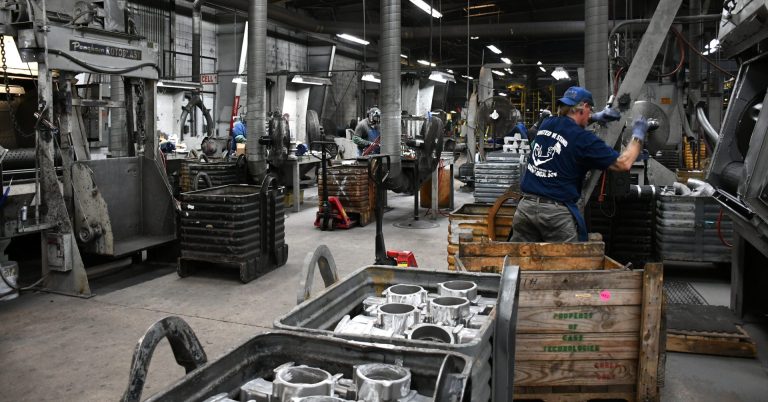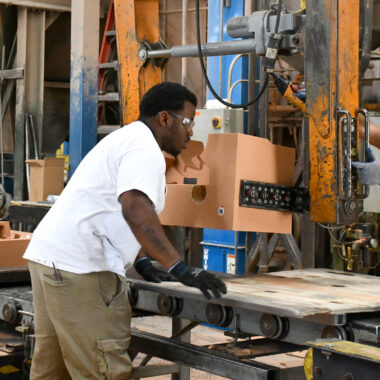Professionals in Aluminum Casting Illinois: Boost Your Production
Professionals in Aluminum Casting Illinois: Boost Your Production
Blog Article
Grasping the Craft: Professional Tips for Flawless Aluminum Casting Outcomes
In the world of light weight aluminum experience, accuracy and spreading are extremely important to accomplish impeccable results. Mastering the craft calls for a careful understanding of the tools and equipment at one's disposal, an eager eye for preparing the light weight aluminum alloy to precise specs, and a deft hand in employing optimum casting techniques. Nonetheless, the real mark of a skilled specialist depend on their ability to attain perfectly smooth surface coatings that raise the quality of the last product. Quality assurance and troubleshooting are necessary elements that can make or break a spreading job, guaranteeing that every action is carried out with the utmost care and focus to detail.
Important Devices and Equipment
Light weight aluminum casting needs details devices and equipment to guarantee accuracy and efficiency while doing so. Essential tools include a crucible, heater, mold, and ladle. The crucible, generally made of graphite or ceramic products, withstands high temperatures needed to melt aluminum. A well-insulated heater with the ability of reaching temperatures over 1200 ° C is necessary to melt the metal. The mold, frequently constructed from steel or sand, forms the liquified light weight aluminum right into the preferred type. A ladle is utilized to transfer the fluid steel from the crucible to the mold without spillage.
In addition, devices like aprons, gloves, and tongs are essential to make certain the safety and security of drivers working with liquified light weight aluminum. Tongs offer a safe grip when handling warm crucibles and molds, while heat-resistant handwear covers and aprons safeguard against unintentional burns. Proper air flow systems are also crucial to get rid of fumes and make sure a safe workplace. Purchasing high-grade tools and devices not only enhances the precision of aluminum spreading however additionally contributes to an extra effective and secure production procedure.
Preparing the Light Weight Aluminum Alloy
To guarantee the success of the light weight aluminum spreading procedure, meticulous preparation of the alloy is extremely important. The very first step in preparing the aluminum alloy is to meticulously select the proper sort of light weight aluminum based upon the qualities required for the end product. Aspects such as toughness, deterioration resistance, and machinability need to be taken into consideration when picking the alloy. As soon as the alloy kind is identified, it is vital to effectively cleanse the light weight aluminum to get rid of any impurities that could affect the casting quality. This can be done through methods like fluxing, degassing, and filtering.
After cleansing, the following vital step is to heat the aluminum to the appropriate temperature level for spreading. This procedure, referred to as alloy melting, guarantees that the light weight aluminum remains in its molten kind and all set for casting (aluminum casting illinois). Furthermore, managing the temperature level during melting is vital to stop getting too hot or underheating, which can result in defects in the last product. In general, precise prep work of the aluminum alloy sets the structure for a successful spreading process and top notch outcome.
Ideal Casting Methods
Executing exact spreading strategies is important for achieving high-quality results in aluminum casting processes. The aluminum ought to be heated up to the ideal temperature level to decrease problems like shrinking and porosity in the final cast.
Moreover, keeping regular pouring speed and pressure is essential to achieving uniformity in the cast piece. Constant and slow pouring helps avoid turbulence and air entrapment, which can cause blemishes. An additional crucial facet is the usage of degassing representatives to get rid of impurities and gases from the molten aluminum, resulting in a cleaner last item.

Achieving Smooth Surface Area Completes
For producers seeking to boost the visual allure and top quality of their light weight aluminum castings, achieving smooth surface area finishes is an indispensable aspect adhering to precise casting techniques and correct air conditioning procedures. One key technique to achieve smooth surface area coatings is by using premium molds that are properly prepared and kept. The mold surface area must be thoroughly cleaned and covered with launch agents to protect against blemishes transferring onto the cast light weight aluminum during the cooling process.
In addition, managing the cooling price of the aluminum spreading is vital for accomplishing a smooth surface area finish. Rapid air conditioning can result in thermal slopes that result in surface flaws, while slow air conditioning might trigger microstructural concerns - aluminum casting illinois. By carrying out controlled air conditioning processes, such as making use of air or water quenching techniques, suppliers can make sure that the light weight aluminum solidifies evenly, lowering the possibility of surface area imperfections
In enhancement to mold and mildew high quality and cooling down procedures, post-casting treatments like shot blasting or chemical etching can further fine-tune the surface finish of light weight aluminum he has a good point castings. These methods aid smoothen out any kind of continuing to be roughness or impurities, resulting in a remarkable look that meets the finest standards.
Quality Assurance and Troubleshooting

In the realm of troubleshooting, it is crucial to have an extensive understanding of typical defects that can occur during light weight aluminum spreading, such as porosity, shrinking, or surface area irregularities. Continuous renovation through high quality control and fixing practices is basic to attaining perfect results in light weight aluminum spreading.
Verdict
In final thought, mastering the craft of light weight aluminum casting calls for crucial tools and tools, appropriate prep work of the light weight aluminum alloy, ideal spreading methods, accomplishing smooth surface coatings, and implementing top quality control steps. By adhering to these professional pointers, flawless outcomes can be accomplished in light weight aluminum casting procedures. Quality control and troubleshooting are essential aspects to take into consideration to ensure regular and high-grade lead to aluminum casting jobs.
The initial action in preparing the light weight aluminum alloy is to carefully choose the suitable kind of light weight find this aluminum based on the qualities required for the last product.Applying precise casting methods is essential for accomplishing high-grade results in aluminum casting processes. By grasping these ideal spreading strategies, producers can regularly generate remarkable light weight aluminum castings.
For producers looking for to boost the visual charm and high quality of their light weight aluminum spreadings, attaining smooth surface area coatings is a crucial facet following precise casting techniques and proper cooling procedures.In conclusion, mastering the craft of light weight aluminum casting requires necessary devices and devices, appropriate preparation of the aluminum alloy, optimal casting methods, accomplishing smooth surface coatings, and executing top quality control actions.
Report this page